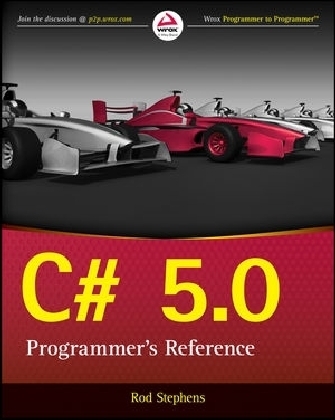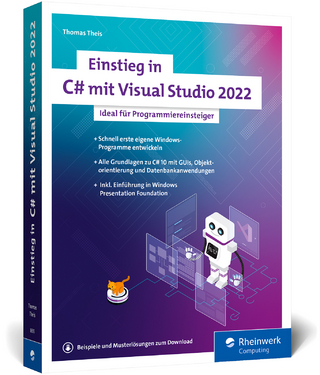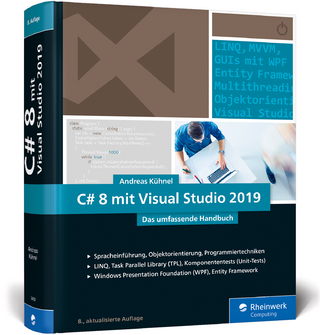
C# 5.0 Programmer′s Reference
John Wiley & Sons Inc (Verlag)
978-1-118-84728-2 (ISBN)
- Titel ist leider vergriffen;
keine Neuauflage - Artikel merken
Stay ahead of the game with this comprehensive guide to the C# programming language Well-known C# expert Rod Stephens gives novice and experienced developers a comprehensive tutorial and reference to standard C#. This new title fully covers the latest C# language standard, C# 5.0, as well as its implementation in the 2013 release of Visual Studio. The author provides exercises and solutions; and his C# Helper website will provide readers and students with ongoing support. This resource is packed with tips, tricks, tutorials, examples, and exercises and is the perfect professional companion for programmers who want to stay ahead of the game. Author Rod Stephens is a well-known programming authority and has written more than 25 programming books covering C#, Java, VB, and other languages. His books have sold more than 150,000 copies in multiple editions. This book's useful exercises and solutions are designed to support training and higher education adoptions.
* Learn the full range of C# programming language features * Quickly locate information for specific language features in the reference section * Familiarize yourself with handling data types, variables, constants, and much more * Experiment with editing and debugging code and using LINQ Beginning through intermediate-level programmers will benefit from the accessible style of C# 5.0 Programmer's Reference and will have access to its comprehensive range of more advanced topics. Additional support and complementary material are provided at the C# Helper website, www.csharphelper.com. Stay up-to-date and improve your programming skills with this invaluable resource.
Rod Stephens is a C# and Windows programming expert with more than 25 programming books to his credit, covering C#, Java, VB, and other programming languages. Rod s C# Helper Website (www.csharphelper.com) receives almost 1 million post views per year, and provides tips, tricks, and code examples for professional C# programmers.
Introduction xxxiii Part I: The C# Ec osystem Chapter 1: The C# Environment 3 Visual Studio 3 The C# Compiler 4 The CLR 6 The .NET Framework 8 Summary 9 Exercises 10 Chapter 2: Writing a First Program 11 Types of Projects 11 Console Applications 14 Windows Forms Applications 16 WPF Applications 19 Windows Store Applications 21 Summary 23 Exercises 24 Chapter 3: Program and Code File Structure 27 Hidden Files 28 Preprocessor Directives 31 #define and #undef 31 #if, #else, #elif, and #endif 33 #warning and #error 34 #line 34 #region and #endregion 35 #pragma 36 Code File Structure 37 The using Directive 38 The namespace Statement 40 Class Definitions 42 Comments 43 End-of-line and Multiline Comments 43 XML Comments 45 Summary 48 Exercises 48 Part II: C# Language Elements Chapter 4: Data Types, Variables, and Constants 53 Data Types 54 Value Versus Reference Types 57 The var Keyword 58 Variable Declaration Syntax 59 Name 62 Attributes 62 Accessibility 63 Static, Constant, and Volatile Variables 64 Initialization 65 Classes and Structures 66 Arrays 67 Collections 68 Literal Type Characters 69 Data Type Conversion 72 Implicit Conversion 73 Casting 74 Using the as Operator 76 Casting Arrays 77 Parsing 77 Using System.Convert 78 Using System.BitConverter 78 ToString 79 Scope 79 Block Scope 79 Method Scope 80 Class Scope 81 Restricting Scope 81 Parameter Declarations 82 By Value 82 By Reference 83 For Output 84 Unusual Circumstances and Exceptions 85 Properties 86 Enumerations 88 Nullable Types 92 Delegates 93 Summary 95 Exercises 96 Chapter 5: Operators 99 Arithmetic Operators 100 Result Data Type 100 Shift Operators 101 Increment and Decrement Operators 101 Comparison Operators 102 Logical Operators 103 Bitwise Operators 105 Conditional and Null-coalescing Operators 106 Assignment Operators 107 Operator Precedence 108 The StringBuilder Class 110 DateTime and TimeSpan Operations 111 Operator Overloading 112 Comparison Operators 113 Logical Operators 115 Type Conversion Operators 115 Summary 117 Exercises 118 Chapter 6: Methods 121 Method Declarations 122 Attributes 122 Accessibility 124 Modifiers 124 Name 128 Return Type 128 Parameters 129 Implementing Interfaces 133 Extension Methods 135 Lambda Expressions 136 Expression Lambdas 136 Statement Lambdas 137 Async Lambdas 138 Variance 139 Asynchronous Methods 140 Calling EndInvoke Directly 140 Handling a Callback 141 Using Async and Await 144 Summary 146 Exercises 147 Chapter 7: Program Control Statements 151 Decision Statements 151 if-else Statements 152 switch Statements 153 Enumerated Values 156 Conditional and Null-coalescing Operators 157 Looping Statements 157 for Loops 157 Noninteger for Loops 159 while Loops 160 do Loops 161 foreach Loops 161 Enumerators 163 Iterators 164 break Statements 165 continue Statements 165 Summary 166 Exercises 166 Chapter 8: LINQ 169 Introduction to LINQ 171 Basic LINQ Query Syntax 173 from 173 where 174 orderby 175 select 175 Using LINQ Results 177 Advanced LINQ Query Syntax 178 join 178 join into 179 group by 179 Aggregate Values 181 Set Methods 182 Limiting Results 183 Other LINQ Methods 184 LINQ Extension Methods 185 Method-Based Queries 185 Method-Based Queries with Lambda Functions 187 Extending LINQ 188 LINQ to Objects 189 LINQ to XML 189 XML Literals 190 LINQ into XML 191 LINQ out of XML 192 LINQ to ADO.NET 194 LINQ to SQL and LINQ to Entities 194 LINQ to DataSet 195 PLINQ 198 Summary 200 Exercises 201 Chapter 9: Error Handling 205 Bugs Versus Undesirable Conditions 206 Catching Bugs 206 Code Contracts 209 Catching Undesirable Conditions 213 Global Exception Handling 216 try catch Blocks 220 Exception Objects 223 Throwing Exceptions 224 Rethrowing Exceptions 226 Custom Exceptions 227 Summary 229 Exercises 229 Chapter 10: Tracing and Debugging 231 The Debug Menu 232 The Debug Windows Submenu 234 The Breakpoints Window 235 The Immediate Window 237 Trace Listeners 238 Summary 240 Exercises 241 Part III: Object-Oriented Programming Chapter 11: OO P Concepts 245 Classes 245 Encapsulation 248 Inheritance 250 Inheritance Hierarchies 251 Refinement and Abstraction 252 Has-a and Is-a Relationships 257 Adding and Modifying Class Features 257 Hiding and Overriding 258 abstract 261 sealed 262 Polymorphism 263 Summary 266 Exercises 266 Chapter 12: Classes and Structures 269 Classes 270 attributes 270 accessibility 271 abstract | sealed | static 272 partial 273 Structures 275 Value Versus Reference Types 275 Memory Requirements 276 Heap and Stack Performance 277 Object Assignment 277 Parameter Passing 277 Boxing and Unboxing 281 Constructors 282 Structure Instantiation Details 285 Garbage Collection 286 Destructors 286 Dispose 288 Events 290 Declaring Events 290 Raising Events 292 Catching Events 292 Using Event Delegate Types 292 Using Static Events 296 Hiding and Overriding Events 296 Raising Parent Class Events 296 Implementing Custom Events 297 Static Methods 298 Summary 300 Exercises 301 Chapter 13: Namespaces 303 Collisions in .NET 304 The using Directive 304 Project Templates 307 Item Templates 309 The Default Namespace 311 Making Namespaces 311 Resolving Namespaces 313 The global Namespace 314 Summary 315 Exercises 315 Chapter 14: Collection Classes 317 Arrays 318 Dimensions 318 Lower Bounds 318 Resizing 319 Speed 320 Other Array Class Features 320 System.Collections 321 ArrayList 321 StringCollection 324 NameValueCollection 325 Dictionaries 326 ListDictionary 327 Hashtable 328 HybridDictionary 329 StringDictionary 329 SortedList 329 CollectionsUtil 331 Stacks and Queues 331 Stack 331 Queue 333 Generic Collections 335 Collection Initializers 337 Iterators 338 Summary 339 Exercises 340 Chapter 15: Generics 343 Advantages of Generics 344 Defining Generics 344 Generic Constructors 345 Multiple Types 346 Constrained Types 348 Default Values 352 Instantiating Generic Classes 352 Generic Collection Classes 352 Generic Methods 352 Generics and Extension Methods 353 Summary 354 Exercises 355 Part IV: Interacting with the Environment Chapter 16: Printing 359 Windows Forms Printing 359 Basic Printing 360 Drawing Basics 365 WPF Printing 380 Using a Paginator 381 Creating Documents 385 Summary 390 Exercises 390 Chapter 17: Configuration and Resources 393 Environment Variables 394 Setting Environment Variables 394 Using System.Environment 395 Registry 397 Configuration Files 402 Resource Files 405 Application Resources 405 Embedded Resources 406 Localization Resources 407 Summary 408 Exercises 408 Chapter 18: Streams 411 Stream 412 FileStream 414 MemoryStream 415 BinaryReader and BinaryWriter 416 TextReader and TextWriter 418 StringReader and StringWriter 419 StreamReader and StreamWriter 421 Exists, OpenText, CreateText, and AppendText 422 Custom Stream Classes 423 Summary 423 Exercises 424 Chapter 19: File System Objects 425 Filesystem Permissions 426 .NET Framework Classes 426 Directory 426 File 428 DriveInfo 430 DirectoryInfo 431 FileInfo 432 FileSystemWatcher 434 Path 436 Using the Recycle Bin 438 Using the FileIO.FileSystem Class 438 Using API Functions 439 Using Shell32.Shell 440 Summary 443 Exercises 444 Chapter 20: Networking 445 Networking Classes 446 Downloading Information 448 Downloading with WebClient 448 Downloading with WebRequest 451 Uploading Information 455 Uploading with WebClient 455 Uploading with WebRequest 455 Getting FTP Information 456 Sending E mail 458 Sending Text Messages 460 Summary 462 Exercises 463 Part V: Advanced Topics Chapter 21: Regular Expressions 469 Building Regular Expressions 470 Character Escapes 471 Character Classes 472 Anchors 473 Grouping Constructs 474 Quantifiers 475 Alternation Constructs 476 Sample Regular Expressions 476 Using Regular Expressions 478 Matching Patterns 479 Finding Matches 480 Making Replacements 481 Parsing Input 482 Summary 483 Exercises 483 Chapter 22: Parallel Programming 485 Interacting with the User Interface 488 BackgroundWorker 491 TPL 492 Parallel.For 492 Parallel.ForEach 494 Parallel.Invoke 495 Tasks 496 Threads 498 Coordinating Tasks 499 Race Conditions 499 Deadlocks 501 Thread-Safe Objects 503 Summary 504 Exercises 505 Chapter 23: ADO .NET 509 Selecting a Database 510 Using Bound Controls 511 Making a Data Source 511 Making a DataGridView Interface 516 Making a Details Interface 518 Making a DataGrid Interface 518 Loading DataSets 525 Using ADO.NET 527 Summary 530 Exercises 531 Chapter 24: XML 533 Basic XML Syntax 534 Writing XML Data 538 XmlWriter 538 Document Object Model 541 XML Literals 547 Reading XML Data 547 XmlTextReader 547 Document Object Model 550 Related Technologies 551 XPath 552 XSLT 555 Summary 559 Exercises 559 Chapter 25: Serialization 563 XML Serialization 564 Performing Serialization 565 Controlling Serialization 569 JSON Serialization 573 Performing Serialization 574 Controlling Serialization 575 Binary Serialization 576 Summary 578 Exercises 578 Chapter 26: Reflection 581 Learning About Classes 582 Getting and Setting Properties 585 Getting Assembly Information 589 Invoking Methods 591 Running Scripts 593 Summary 597 Exercises 597 Chapter 27: Cryptography 601 Cryptographic Operations 602 Randomness 603 Using Random Numbers for Encryption 604 Using Encryption for Random Numbers 604 Cryptographically Secure Randomness 604 Generating Random Numbers 605 Symmetric Key Encryption 608 Simple Encryption and Decryption 608 Keys and Initialization Vectors 612 Generating Key and IV Values 613 Asymmetric Key Encryption 614 Creating, Saving, and Retrieving Keys 615 Encrypting Data 616 Decrypting Data 616 Example Encryption 617 Summary 619 Exercises 619 Part VI: Appendices Appendix A: Solutions to Exercises 625 Chapter 1 625 Chapter 2 626 Chapter 3 627 Chapter 4 629 Chapter 5 631 Chapter 6 635 Chapter 7 638 Chapter 8 642 Chapter 9 648 Chapter 10 655 Chapter 11 659 Chapter 12 665 Chapter 13 667 Chapter 14 668 Chapter 15 673 Chapter 16 678 Chapter 17 682 Chapter 18 685 Chapter 19 689 Chapter 20 694 Chapter 21 702 Chapter 22 706 Chapter 23 711 Chapter 24 713 Chapter 25 720 Chapter 26 725 Chapter 27 728 Appendix B: Data Types 733 Casting and Converting Values 734 Widening and Narrowing Conversions 735 Converting Objects 735 The as Operator 735 Casting Arrays 736 Parsing Values 736 Appendix C: Variable Declarations 737 Initialization Expressions 738 Using 739 Enumerated Type Declarations 739 Appendix d: Constant Declarations 741 Appendix e: Operators 743 Arithmetic Operators 743 Comparison Operators 744 Logical Operators 744 Bitwise Operators 745 Assignment Operators 745 Conditional and Null-coalescing Operators 745 Operator Precedence 745 DateTime and TimeSpan Operators 747 Operator Overloading 748 Appendix f: Method Declarations 749 Methods 749 Property Procedures 750 Lambda Functions and Expressions 750 Extension Methods 751 Appendix g: Useful Attributes 753 Useful XML Serialization Attributes 753 Useful JSON Serialization Attributes 754 Binary Serialization Attributes 754 Other Useful Attributes 755 Appendix h: Control Statements 757 Decision Statements 757 if-else Statements 757 switch 757 Conditional and Null-coalescing Operators 758 Looping Statements 758 for Loops 758 while Loops 759 do Loops 759 foreach Loops 759 Enumerators 760 Iterators 760 break and continue Statements 760 Appendix i: Error Handling 761 Throwing Exceptions 762 Appendix j: LINQ 763 Basic LINQ Query Syntax 763 from 763 where 764 orderby 764 select 764 join 765 group by 765 Aggregate Values 766 Limiting Results 766 LINQ Functions 767 LINQ to XML 768 XML Literals 768 LINQ into XML 768 LINQ out of XML 769 LINQ to ADO.NET 770 PLINQ 771 Appendix k: Classes and Structures 773 Classes 773 Structures 774 Constructors 774 Destructors 774 Events 775 Appendix l: Collection Classes 777 Arrays 777 Simple Arrays 777 Array Objects 778 Collections 779 Specialized Collections 779 Generic Collections 779 Collection Initializers 780 Iterators 780 Appendix m: Generic Declarations 783 Generic Classes 783 Generic Methods 784 Appendix n: Printing and Graphics 785 Windows Forms Printing 785 Printing Steps 785 Graphics Namespaces 786 Drawing Graphics 787 WPF Printing 795 Using a Paginator 795 Creating Documents 796 Appendix o: Useful Exception Classes 799 Standard Exception Classes 799 Custom Exception Classes 802 Appendix p: Date and Time Format Specifiers 803 Standard Format Specifiers 803 Custom Format Specifiers 804 Appendix q: Other Format Specifiers 807 Standard Numeric Format Specifiers 807 Custom Numeric Format Specifiers 809 Numeric Formatting Sections 809 Composite Formatting 810 Enumerated Type Formatting 811 Appendix r: Streams 813 Stream Class Summary 813 Stream 814 BinaryReader and BinaryWriter 815 TextReader and TextWriter 817 StringReader and StringWriter 818 StreamReader and StreamWriter 818 Text File Stream Methods 818 Appendix s: Filesystem Classes 821 Framework Classes 821 Directory 821 File 823 DriveInfo 825 DirectoryInfo 826 FileInfo 827 FileSystemWatcher 829 Path 830 Special Folders 832 Recycle Bin 832 FileIO.FileSystem 833 API Functions 833 Shell32.Shell 834 Appendix t: Regular Expressions 835 Creating Regular Expressions 835 Character Escapes 835 Character Classes 836 Anchors 836 Regular Expression Options 837 Grouping Constructs 838 Quantifiers 838 Alternation Constructs 838 Sample Regular Expressions 839 Using Regular Expressions 839 Matching Patterns 840 Finding Matches 840 Making Replacements 841 Appendix u: Parallel Programming 843 Interacting with the User Interface 843 PLINQ 843 BackgroundWorker 844 TPL 844 Parallel.For 845 Parallel.ForEach 845 Parallel.Invoke 845 Tasks 845 Threads 847 Appendix v: XML 849 Special Characters 849 Writing XML Data 849 XmlWriter 850 Document Object Model 851 XML Literals 854 Reading XML Data 854 XmlTextReader 854 Document Object Model 856 Related Technologies 856 XPath 857 XSLT 858 Appendix w: Serialization 859 XML Serialization 859 Controlling Serialization 860 JSON Serialization 861 Performing Serialization 861 Controlling Serialization 862 Binary Serialization 863 Appendix x: Reflection 865 Type 865 MemberInfo 870 EventInfo 870 MethodInfo 871 FieldInfo 873 PropertyInfo 874 ParameterInfo 874 Index 877
| Verlagsort | New York |
|---|---|
| Sprache | englisch |
| Maße | 187 x 233 mm |
| Gewicht | 1624 g |
| Themenwelt | Informatik ► Programmiersprachen / -werkzeuge ► C# |
| Informatik ► Software Entwicklung ► Objektorientierung | |
| ISBN-10 | 1-118-84728-8 / 1118847288 |
| ISBN-13 | 978-1-118-84728-2 / 9781118847282 |
| Zustand | Neuware |
| Haben Sie eine Frage zum Produkt? |
aus dem Bereich


